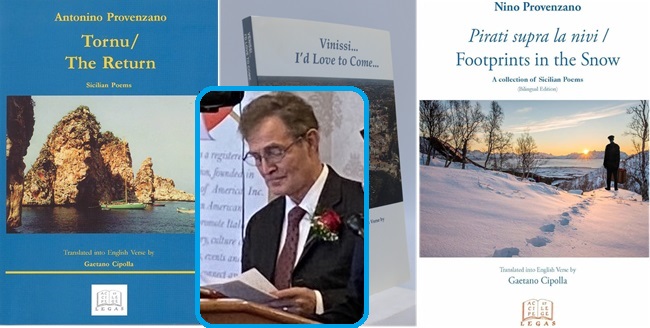Interview by Tiziano Thomas Dossena
Nino Provenzano is a Sicilian American poet, translator, author, and Vice President of “Arba Sicula”. Provenzano’s poems were included in Poets of the Italian Diaspora, edited by Prof. L. Bonaffini and Prof. G. Perricone, published in 2014, and they frequently appear in Arba Sicula and in Sicilia Parra, for which he also writes book reviews. He is well known in the Sicilian-Italian-American communities in the United States and he is often called to recite his poetry in schools, social clubs, cultural organizations, and Universities, including the Yale Poetry Club in Manhattan. Most recently, on the 7th of June 2023, Nino was invited to recite his Sicilian Poetry at Columbia University and on June 13th at ELA (Endangered Language Alliance), both in New York City. In July 2023, the yearly Korean Expatriate Literature book featured one of Nino’s poems both in English and Korean languages. Nino has won several Poetry Prizes, including the “Salvatore Quasimodo” from the City of Messina, Italy.
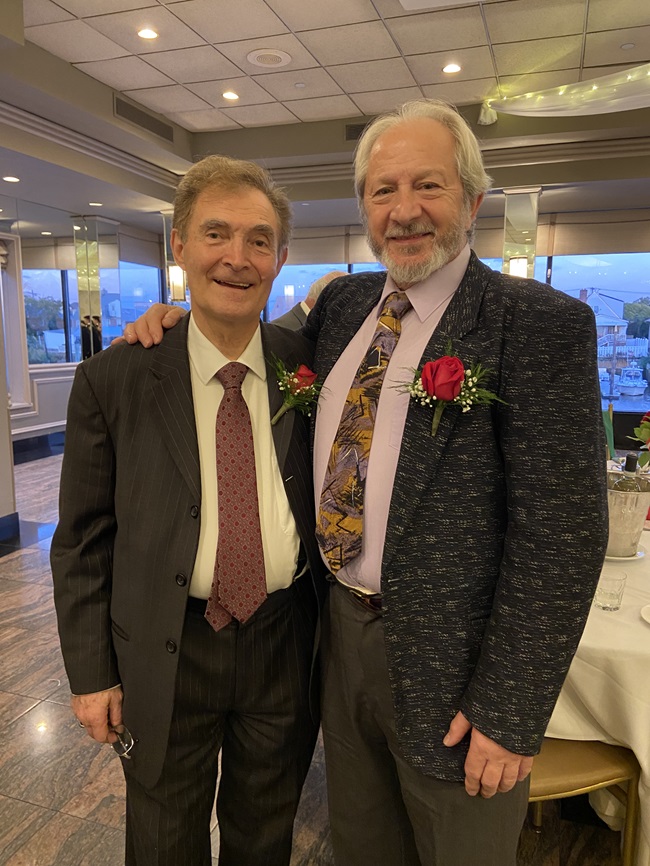
L’Idea Magazine: Hello Nino. Last October 22, I was fortunate enough to be present at Villa Roma, in Queens, at the ceremony for the “Italian Regional Languages Award,” bestowed upon you by the Italian Charities of America. It was well deserved, and your reading of one of your poems proved it even more. When did you start to write poems in Sicilian? What was the trigger that inspired you to do that?
Nino Provenzano: Ever since I was a child, I had a passion for playing with words. In elementary and middle school in Italy, whenever the teacher gave an assignment to learn about a certain poet, I would instinctively memorize the poems of that author. When I was twelve, I was inspired to write a poem in my notebook about my teacher. In it, I expressed how great she was and how I loved her. Days later, when the teacher collected our notebooks, I was terrified! At the end of the class that day, she called me into her office and with the benign smile of a mother she said to me “I love what you wrote. Don’t be afraid or embarrassed”, she said, “when you express in writing what you feel, keep on doing it”. That day Miss Lucchese opened the gate of a shy twelve-year-old child. Since then, I haven’t stopped writing!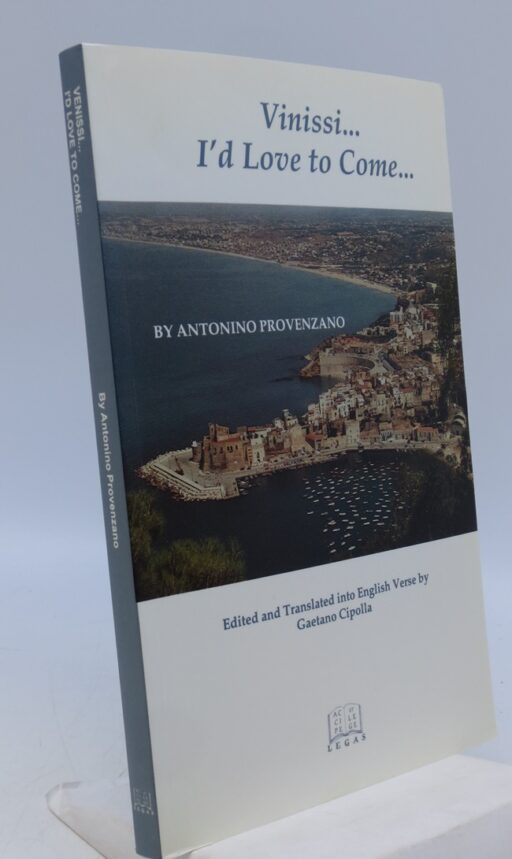
L’Idea Magazine: Your first collection of poems, “Vinissi” (I Would Love to Come), was published in 1999. Is there a theme in the book or are they all the poems you wrote up to that year? Could we publish here one of the poems from that collection?
Nino Provenzano: The first anthology I published after years of living in the USA, took the name of “Vinissi”, which was the name of a poem. “Vinissi” was a twenty-five-octave poem written in the classic Sicilian format with alternate rhyme and in hendecasyllable. In it, the emigrant expresses the desire and the fear of going back home to visit. Unlike Ulysses, this emigrant has a strong desire to go back home to see the place he left and the people dear to him. But the fear that what he would find would not be as he remembered, held him back. Not to face disappointment, this emigrant decides to visit his birthplace at night. He would walk only the streets of the old part of the town that he knew and he grew up in. He would stop in front of the house where his neighbors, relatives, and young friends lived. He stopped in front of each house with closed doors and would imagine the people living in them, as they were when he left. He did not wish to meet anyone who could destroy his memory of many years ago. Before dawn, he had to flee but needed to make one more stop. Under the door of City Hall, he slips a note to let the Mayor know that he was there from the USA to visit. These are the words of the last two octaves of the poem “Vinissi”, directed to the mayor of the town:
“Egregiu Signor Sinnacu, dumani
Quannu chi agghiorna e sta littra liggiti,
siddu sintiti chi li paisani
vittiru un vacabunnu ‘nsuspittiti
assicurati sti boni cristiani
chi un era un latru, ed ora lu sapiti.
Dicitilu “Chiss’era un emigratu
‘nta lu diliriu di notti turnatu.
Avia na smania ‘ntesta, avia un smaceddu,
criria stu me paisi stracanciatu
vinni di notti e mi parsi chiù beddu
l’appi tuttu pi mia, un fu disturbatu.
Scappu prima chi aggiorna ammucciuneddu
e chistu lu vaiu a cuntu a ogni emigratu.
A stu paisi miu haiu tantu amuri
Nun lu malitrattati, pi favuri.
L’Idea Magazine: Ten years went by and then you published a second collection of poems, “Tornu” (The Return). Any theme to this book? Were all the poems translated into English by Dr. Gaetano Cipolla? Was there an evolution of any kind from the first book to this one?
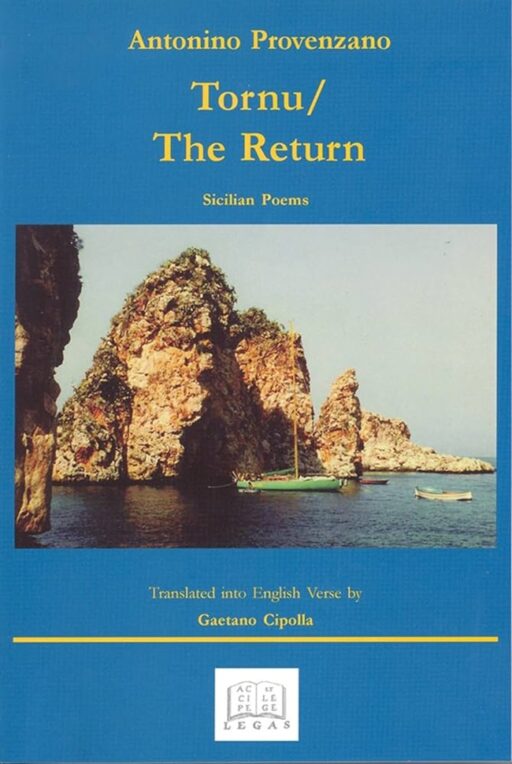 Nino Provenzano: In the second anthology “Tornu -The Return” the poems reflect more on social issues. Poverty, abuse of women, children, and bullying in schools are some of the common themes. Reflection on mortality, love for life, admiration for beauty, and being tolerant of each other’s shortcomings are also clothed in metaphors.
Nino Provenzano: In the second anthology “Tornu -The Return” the poems reflect more on social issues. Poverty, abuse of women, children, and bullying in schools are some of the common themes. Reflection on mortality, love for life, admiration for beauty, and being tolerant of each other’s shortcomings are also clothed in metaphors.
Satire, in this volume, is present in more pages than the first collection. “La Valigia”, “Lu Dutturi cu la Prescia”, “La Mascara”, “L’uffici Italiani” are always requested when I recite in venues where the audience knows me. The poem “Tornu – The Return” is somewhat of a closure or a truce I negotiated with nostalgia. This poem tells my birthplace what is the meaning, the purpose, and the need for my return. I feel I’m the product of my past, and I have to interact and have a relationship with it. Each time I go back, I realize that the present and the plans for the future have no meaning if there is no connection with the past.
The poem “Picchì Semu Italiani” is the dialogue where a young girl asks her emigrant father what the big deal is about being Italian. Below is part of his response to his daughter, in the last octave of the poem:
Immagina un munnu senza li spaghetti
o la lasagna, li ziti ‘nfurnati,
dda ricca sarsa chi ncapu ci metti
ch’è la dilizia di l’umanitati.
Milinciani ‘mpanati, li purpetti,
cannola, cassateddi li cassati.
Si eu un nascia Italianu, Diu ni scanza!
Ma cui la cunurtassi sta me’ panza?
L’Idea Magazine: Your last book, “Pirati Supra La Nivi” (Footprints in the Snow), is from 2016. Any poem from that book that is more significant for you? What do you feel when you read your own poems aloud to the public? Any other poetry book in the near future?
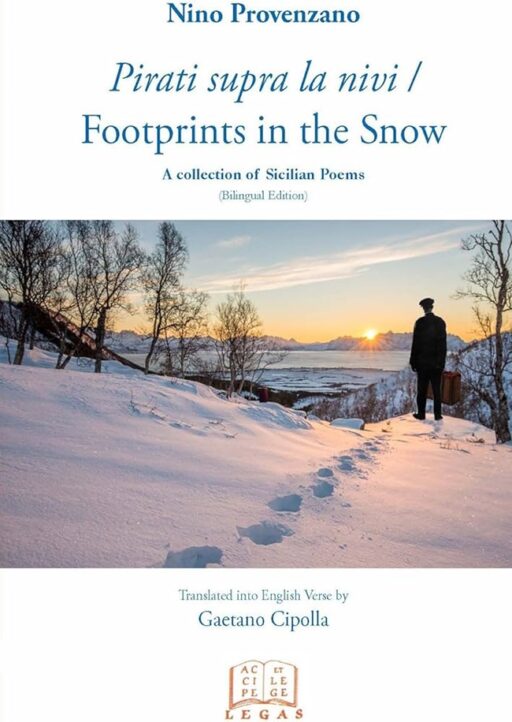 Nino Provenzano: “Pirati Supra La Nivi” – “Footprints in the Snow” is also the name of one of my poems which underlines the fact that the traces humans leave behind with their existence over the course of their journey on earth, are mere footprints in the snow. They are destined to be canceled soon and fast. The themes of human suffering, the need to respect nature and not to become enslaved by consumerism and technology are proposed. One of the poems I cherish is a sad one “Cantu Amaru” (Bitter Song). I dedicated this poem to all the victims of the mafia including Falcone, Borsellino, Piersanti Mattarella, etc. This poem bears naked the unbearable pain of the emigrant who knowing the tragedy of his homeland, left his country angry and powerless. A copy of “Pirati Supra La Nivi” was sent to the President of the Italian Republic, Sergio Mattarella, who thanked me with a kind note. Mattarella’s family was from my hometown Castellammare del Golfo. All three of my published anthologies were translated into English by Professor Gaetano Cipolla. Reading my poems in public makes me feel a direct connection with all those who share my Sicilian heritage.
Nino Provenzano: “Pirati Supra La Nivi” – “Footprints in the Snow” is also the name of one of my poems which underlines the fact that the traces humans leave behind with their existence over the course of their journey on earth, are mere footprints in the snow. They are destined to be canceled soon and fast. The themes of human suffering, the need to respect nature and not to become enslaved by consumerism and technology are proposed. One of the poems I cherish is a sad one “Cantu Amaru” (Bitter Song). I dedicated this poem to all the victims of the mafia including Falcone, Borsellino, Piersanti Mattarella, etc. This poem bears naked the unbearable pain of the emigrant who knowing the tragedy of his homeland, left his country angry and powerless. A copy of “Pirati Supra La Nivi” was sent to the President of the Italian Republic, Sergio Mattarella, who thanked me with a kind note. Mattarella’s family was from my hometown Castellammare del Golfo. All three of my published anthologies were translated into English by Professor Gaetano Cipolla. Reading my poems in public makes me feel a direct connection with all those who share my Sicilian heritage.
L’Idea Magazine: You also translated a collection of sonnets from English to Sicilian by well-known Italian American poet, Frank Polizzi. Was that a particularly difficult task? How did you feel about that experience? What made you decide to get involved in such a project?
Nino Provenzano: Frank Polizzi’s ancestors came from Sicily, and he had a particular liking for the Sicilian language. It was the tone, the sound and the inflection of the words he said, that it reminded him of his ancestors. Frank had written a very interesting love story with nine sonnets in English. The name was “Life with Bianca”. We had a lot of meetings when working on the translation and at times we would spend one hour just to define a word or an idiomatic phrase. Sadly, Frank passed away. He was a fine poet, and I miss him.
L’Idea Magazine: You also translated some of the poems from “Journey to the Heart Waters” by Louisa Calio, for The Journal of Italian Translation, edited by Professor Luigi Bonaffini. Did you know Luisa? Did you find the translation challenging?
Nino Provenzano: I personally know Louisa Calio. She has been a dear friend for many years and is a fine poet. Louisa is also a lover of the Sicilian language. Her poetry has a thread that links her to her ancestors, her family’s past, their history, the traditions of the Mediterranean, and to the places she got to know in North Africa. I define Louisa as a photographer of the inner part of the human soul. It was a pleasure to translate her work.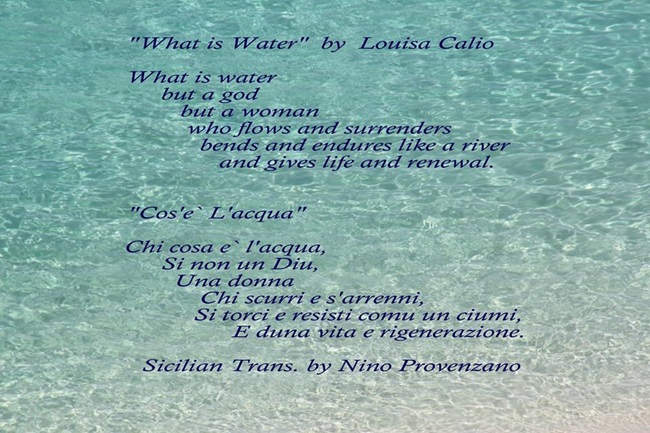
L’Idea Magazine: We also met at the Istituto Italiano di Cultura a few months ago on the occasion of the Premio New York di Poesia “Italiani per il Futuro.” The award contest was promoted by the Italian Embassy in Washington, D.C., and the cultural organizer, Silvana Mangione, in cooperation with the I.C.E. and the Calandra Institute. You read one of your poems before assigning the awards for the Vernacular section. It was in that instant that I realized how warm and emotional is the Sicilian language. Do you also write poems in Italian? Are you going to be at the next award ceremony for the “Italiani per il Futuro?”
Nino Provenzano: Premio New York di Poesia “Italiani per il Futuro” was actually inspired by the yearly poetry recital at the Castellammare Del Golfo Club in Brooklyn. The poet Vincenzo Ancona and I started this tradition 41 years ago. Ancona passed away over 20 years ago, and the Presidents of the club over the years have encouraged me to keep the tradition going. The Castellammare Social Club of Brooklyn is one of the few that in addition to social gatherings, it cultivates the splendor of Sicilian poetry.
I write in Sicilian because it is my first and instinctive language. Occasionally, I write poems in Italian and in English. All my published poems are bi-lingual, Sicilian, and English. I am grateful to the Italian Embassy in Washington DC., to the Cultural Organizer Silvana Mangione, to the Calandra Institute, and to Fabio Finotti, Director of the Istituto Italiano di Cultura di New York, for creating such a significant poetical event for the community. Like last year, I will be on the jury panel again.
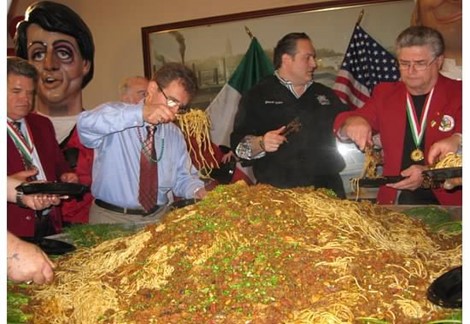
L’Idea Magazine: You collaborated with filmmaker Spike Lee, Actor/Director John Turturro, actor John Leguizamo, and the Emmy Award-winning actor Michael Badalucco. Could you tell us more about each collaboration, please?
Nino Provenzano: I was hired by Spike Lee when he made the movie “Summer of Sam”, to train John Leguizamo, who was playing a hair stylist in the movie. It was fun to be on the set for days with great artists. With John Turturro, I had the pleasure of translating part of the dialogue in the movie “Mac” from English to Sicilian. John won the “Palm D’or” at Cannes for that movie. With Emmy Award-winning actor Michael Badalucco, we have a friendship that goes back a long time. I trained Michael for his role as a barber in the Cohen Brothers’ movie “The Man Who Wasn’t There.” When my second anthology “Tornu”, was published, Michael and I presented it in an English-Sicilian recital at the Player’s Club in New York City. When my third anthology, “Pirati Supra la Nivi” was published, I was invited to present the book at “Seton Hall University” in New Jersey. Together with Michael Badalucco, we recited several poems from my new publication.
In 2017, NIAF (National Italian American Foundation) opened its Gala in Washington, DC. with one of my poems “Nun Ponnu” – “They Cannot”, choreographed with panoramic views, while Michael Badalucco and I recited “Nun Ponnu”, one stanza in Sicilian and one in English, with the intermezzo of Cavalleria Rusticana playing in the background. This can currently be viewed on YouTube under Nino Provenzano Poet NIAF 2017.
Because I wrote a poem on behalf of the people affected by Hurricane Katrina, the Sicilian-American organization that sponsors the St. Joseph’s Day festivities in New Orleans invited me and Michael to read the poem “A San Giuseppi” at their three-day celebration. Each year at this event, they cook over four hundred pounds of Pasta con Sarde for a tremendous crowd that I had never seen under one roof.
“A San Giuseppi”
O San Giuseppi, ‘ncelu cu li santi,
umili regni e brilli eternamenti,
faru di la famigghia si custanti,
patri c’aiuti a cui ti cerca e senti.
Di la Sicilia ccà ogni emigranti
dintra lu cori sò sigritamenti
ti porta appressu ti teni davanti.
tuunn’abbannuni mai chi si climenti.
A New Orleans ti onoramu ogn’annu
cu ‘na gran festa e chiossai divuzioni.
O San Giuseppi chiù priamu st’annu
pi cu è chi soffri, chi cust’alluvion
natura siminau tanta ruvina.
Danni la firi c’anniau Katrina…!!!
L’Idea Magazine: Do you see a future in the USA for Italian Vernacular diffusion and popularity?
Nino Provenzano: While regional languages (dialects) are sort of fading into the dominant national languages, there is a cultural interest in the world to preserve these minority languages. I’ve been invited a number of times by a very interesting organization called ELA – Endangered Language Alliance in New York City, to recite in Sicilian. There, I have met scholars from all over the globe and learned that this phenomenon has common denominators, economics, political shifts, and rapid changes in mass media communication among others. Speaking of the Sicilian language, I’m not really worried about its disappearance. I believe that Sicilian is changing like all languages do. Only now, with the speed of today’s technology, even more so. I have noticed that the Sicilian language is also affecting the Italian language. I’m sure that the following authors among others, had something to do with it: Verga, Brancati, Tomasi di Lampedusa, Vittorini, Martoglio, Capuana, Salvatore Quasimodo, Pirandello, Sciascia, and lastly Camilleri.
In the USA, the presence of Arba Sicula has been crucial for the cultivation of the Sicilian language among Sicilian immigrants. Professor Gaetano Cipolla has been instrumental in publishing Arba Sicula, which is the official journal of the Sicilian-American organization by the same name whose principal objective is to preserve, study, and promote the language and culture of Sicily.
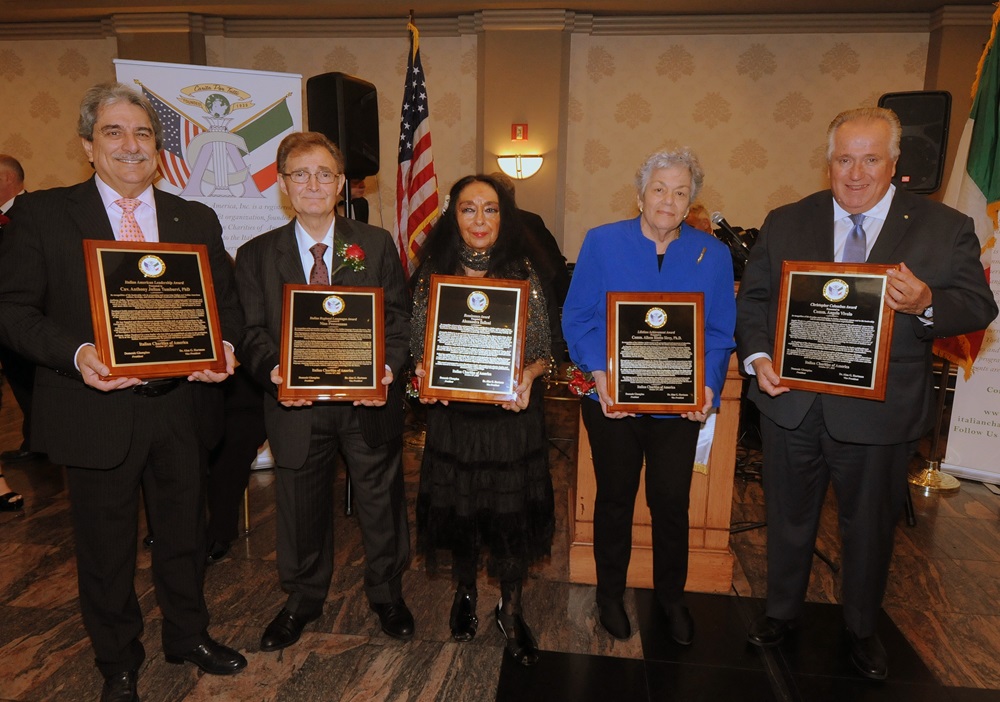
L’Idea Magazine: Do you have any projects for the near future that you are working on currently?
Nino Provenzano: Yes, I have all the material ready for my next bi-lingual anthology. I am working on the title and the cover design. I hope to publish within the next year.
L’Idea Magazine: Where do you find the inspiration for your poems in such a period of turmoil in the world?
Nino Provenzano: I have never looked for a subject to write a poem. It is always the subject that finds me. I usually get the notice at peculiar times and when the mind is in neutral. It can happen when I stare at something, a singing bird, a tree, the horizon, a smiling young couple, or an elderly couple holding hands. In a crowded subway, when I look at the faces surrounding me, it is like reading multiple books at the same time. It is amazing! Even looking at the rats down in the subway tracks of Penn Station, makes me realize that these creatures are some of those who, while alive, never see the sunshine.
L’Idea Magazine: If you had one poem to choose from among the many you wrote, which one would it be, and why?<
Nino Provenzano: Each poem is a brainchild, and it’s not easy to choose only one. One poem would not really represent everything I believe in. But if I had to choose at this moment, I would say “Era Febbraiu”. It is a dialogue between a young man and an elderly man sitting in a moving bus. It is Valentine’s Day, and the elderly man is holding a bouquet of red roses in his hands. Here is the poem:
“ Era febbraiu”
(Original poem in Sicilian)
Era febbraiu, un iornu friddulusu,
c’era lu suli, però nun quariava.
Un’autobussu ia pagghiri susu,
siguia la strata però si firmava
pi lassari e pigghiari passaggeri.
A un certu puntu, acchiana un omu anzianu.
Avia ’nmazzu di rosi frischi e veri
e s’iu assittari cu ddi rosi ‘mmanu.
A specchiu ad iddu c’era un giovanottu
chi taliava ddi ciuri e l’ammirava
cu gran curiusità. E poi di bottu
dissi all’anzianu “Eu puru l’accattava
s’avia li sordi, ma haiu sta cartulina,
oggi è San Valintinu e a la me zita
la staiu purtannu propriu ‘sta matina
Ma ni vulemu beni pi la vita!
L’anzianu l’attintau, fici un surrisu,
poi si susiu, e misi chiddi rosi
‘mmanu a ddu giovanottu, chi surprisu
dissi, “Mancu pi sonnu! No sti cosi!
No, nun l’accettu, nun sunnu pi mia!
Eu lu dicia tantu pi parrari!
E lei soccu ci porta dunni ia?”
L’anzianu dissi “Un ti prioccupari!
Portali tu sti rosi a la to amata
ed iu a me muggheri lu va cuntu
chi ti li detti a tia. Sarà priata.
Iu scinnu a sta firmata, sugnu iuntu.
L’autobussu firmau, l’omu scinniu,
senza mancu vutarisi narreri.
Cu li manu vacanti sinni iu.
Passau ddu latu di lu marciaperi.
Ddu giovanottu incredulu siguiu
cu l’occhi a dd’omu e nun ci parsi veru
quannu a distanza vitti chi spinciu
na grara….. e trasiu nta un cimiteru.
L’Idea Magazine: How much did your Italian/Sicilian Heritage influence your life, poetry, and career choices?
Nino Provenzano: Poetry and career influenced my life in a myriad of ways. I retired from my business three years ago. I’m one of those individuals that always loved what he did, and did what he loved. I spent my working life, more than 40 years with actors, politicians, and successful business people. I’ve traveled to hair-related conventions all over the country doing platform shows, teaching hair replacement design, and gray hair reduction for men. My salon was on Park Avenue and 57th Street in New York City. Within my salon, working in a private room for more than one hour or two at a time, with people like Luciano Pavarotti, Robin Williams, or an Arab Emirate, the richest men in the world, and scores of ones that I could never reveal, took the mystery away for me that money and power is everything in this world. Believe me, it is not! In that world, you’ll find great souls, and the most miserable ones as well. From many of them, I learned a lot. At one time, the then NFL Commissioner Paul Tagliabue came with his wife to hear me recite Sicilian poetry at an Arba Sicula affair. Gaetano Cipolla looked at me and asked “Nino how did this guy get here? My answer to Gaetano was “He brought tickets for the Superbowl for me and you. Paul Tagliabue is a Renaissance man who loves literature and culture in general. Many of those clients knew of my passion for poetry and quite a few of them, sometimes asked me to recite to them. The audience of one was also a special audience!
Just to illustrate how a simple action can impress you forever, I have to tell you about Bill Bratton. While he was the Police Commissioner of New York, he came to see me on a regular basis in the Salon. One day he handed me a rosary blessed by the Pope that he brought back from Rome where he was on vacation and said to me, “This is for your wife Josephine.” I thanked him. Josephine showed the rosary to her mother. My mother-in-law had just turned 100 years old, and as soon as she held the rosary in her hand, she kissed it and told Josephine to thank my friend for sending her such a gift. Josephine did not want to explain that this was not her gift and since my mother-in-law was happier than ever, she kept it. When Bill Bratton came to see me again, I told him that Josephine thanked him, though she did not have the rosary any longer. He smiled and said that he wished he could meet my mother-in-law. That afternoon, the very busy Bill Bratton stopped in front of 445 Park Ave. and came into the Salon to give me another blessed rosary for Josephine. With a big smile, he said, “Tell Josephine not to show this to anyone”. How can anyone forget such a kind gesture? “Signori si nasce”!, which means “people are born with class”.

L’Idea Magazine: What do you write mostly about?
Nino Provenzano: I write mostly about love, understanding, suffering, and hope. I recently started to write my memoirs and plan to finish after I publish my next poetry collection.
L’Idea Magazine: Three adjectives to describe you…
Nino Provenzano: Curious, Passionate, and Adaptable.
L’Idea Magazine: What other interests do you have besides writing? Do you have any hobbies?
Nino Provenzano: Gardening is my passion and my hobby. I love to interact with Mother Earth. Besides vegetables and herbs, I cultivate more than twenty fig trees in my garden. Plants, birds, and deer are all friends of mine. Above all, I enjoy spending time with my family — my wife, my 3 daughters, my sons-in-law, and my five grandchildren.
L’Idea Magazine: Any unrealized dreams you feel like sharing with our readers?
Nino Provenzano: I’m dreaming of discovering how it feels to be healthy and 100 years old.
L’Idea Magazine: A message for our readers?
Nino Provenzano: To the readers, I say, “Be the main character in your life story”.


